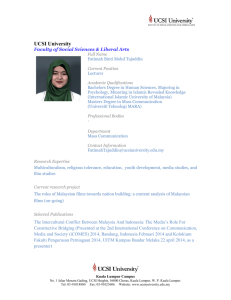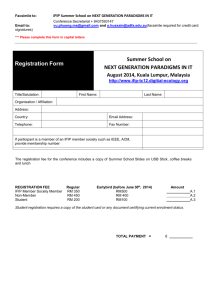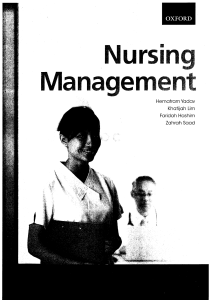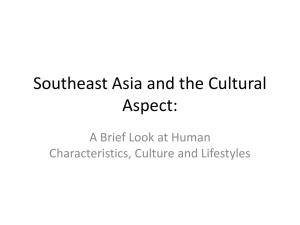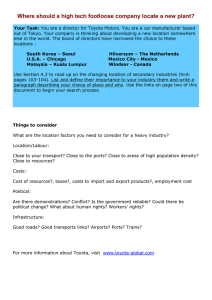Kuala Lumpur (Malaysia): Monitoring and enforcing
advertisement
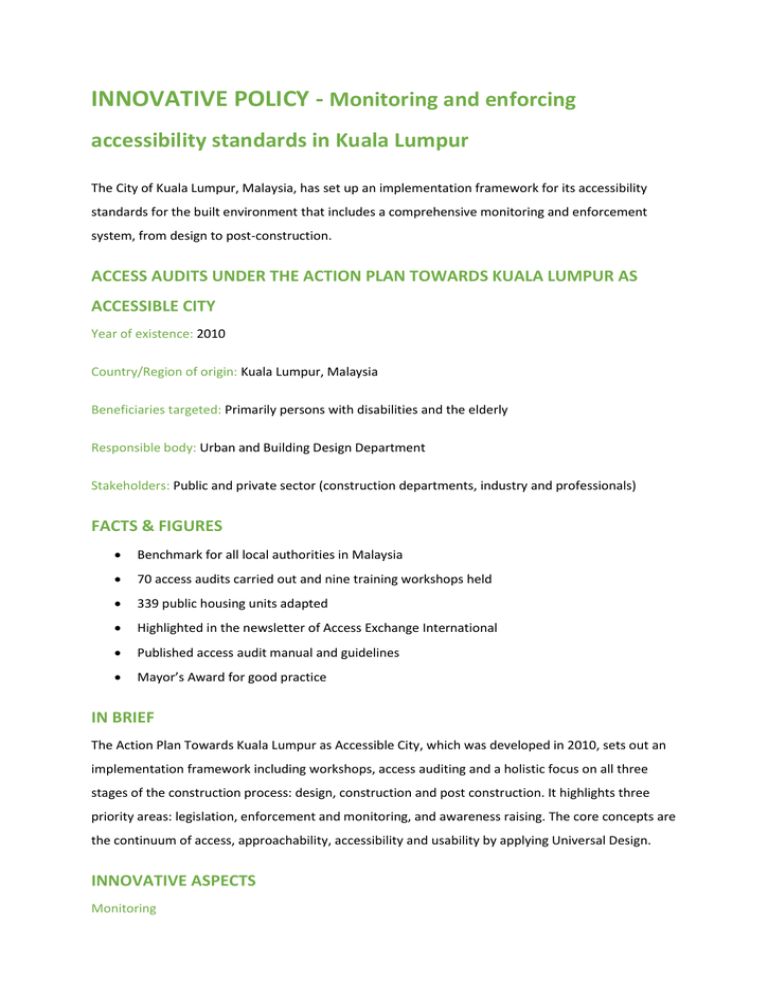
INNOVATIVE POLICY - Monitoring and enforcing accessibility standards in Kuala Lumpur The City of Kuala Lumpur, Malaysia, has set up an implementation framework for its accessibility standards for the built environment that includes a comprehensive monitoring and enforcement system, from design to post-construction. ACCESS AUDITS UNDER THE ACTION PLAN TOWARDS KUALA LUMPUR AS ACCESSIBLE CITY Year of existence: 2010 Country/Region of origin: Kuala Lumpur, Malaysia Beneficiaries targeted: Primarily persons with disabilities and the elderly Responsible body: Urban and Building Design Department Stakeholders: Public and private sector (construction departments, industry and professionals) FACTS & FIGURES Benchmark for all local authorities in Malaysia 70 access audits carried out and nine training workshops held 339 public housing units adapted Highlighted in the newsletter of Access Exchange International Published access audit manual and guidelines Mayor’s Award for good practice IN BRIEF The Action Plan Towards Kuala Lumpur as Accessible City, which was developed in 2010, sets out an implementation framework including workshops, access auditing and a holistic focus on all three stages of the construction process: design, construction and post construction. It highlights three priority areas: legislation, enforcement and monitoring, and awareness raising. The core concepts are the continuum of access, approachability, accessibility and usability by applying Universal Design. INNOVATIVE ASPECTS Monitoring During the construction, access auditors inspect the construction and have the possibility to issue a stop-work order. After the construction, follow-up inspections are carried out. Enforcement Enforcement mechanisms comprise of Access Officers, the Access Advisory Group, Access Inspectors, and Access Auditors. Access statements, inspections and audits are used to monitor and enforce accessibility standards. Awareness raising and training Awareness raising programmes create a constant dialogue, offer workshops for professionals and pilot projects as benchmarking. HISTORY Kuala Lumpur’s Uniform Building Bylaw contains an obligation to respect accessibility standards. Such standards exist regarding the access to public buildings, the access to outdoor spaces, escape routes and minimum design criteria for public toilets. In 2002, under the Biwako Millennium Framework: Towards an Inclusive, Barrier-free and Rights-based Society for Persons with Disabilities in Asia and the Pacific, the Malaysian government committed to achieve a 75% barrier-free environment by 2012. In 2008, the country enacted the Persons with Disabilities Act, which contains accessibility provisions and a definition of Universal Design. In 2010, the city developed the Action Plan Towards Kuala Lumpur as Accessible City. Subsequently, in 2012, access to the physical environment, public transportation, knowledge, information and communication, became goal number three of the Incheon Strategy to “Make the Right Real” for Persons with Disabilities in Asia and the Pacific. «Awareness, expertise, monitoring and sanctions in case of non-compliance, are the key to successfully enhance implementation, monitoring and enforcement of accessibility standards.» (Dalilah Bee Abdullah, Kuala Lumpur City Hall Training Institute, Malaysia) KEY FEATURES Under Kuala Lumpur’s Action Plan, all new construction and retrofitting works must be universally designed. For construction to be approved, the submitted building plans must comply with the accessibility standards. The construction permit is only issued once approval has been given. To enable court action in case of non-compliance, every submitting person needs to sign a certification that they accept full responsibility. Furthermore, they have to issue an Access Statement describing all accessible facilities in public buildings. During the construction, access auditors of the Kuala Lumpur City Hall inspect the construction and have the possibility to issue a stop-work order. After the construction, follow-up inspections by access auditors grant either a Certificate of Compliance or require the constructor to make adaptations or re-build. The Periodic Inspection Unit monitors existing buildings. In addition, awareness-raising programmes are held. IMPLEMENTATION In 2010, Kuala Lumpur City Hall created a special Innovation and Building Standard Unit which serves as a secretariat to set up guidelines, design methods of access, run courses, conduct access audits and perform upgrades, as well as enter into dialogue with persons with disabilities. It set up four enforcement mechanisms: Access Officers, the Access Advisory Group, 27 Access Inspectors and 27 Access Auditors (numbers as of 2013). All audits are conducted with persons with disabilities. Awareness and training programmes on access audits are continuously carried out. Retrofitting and upgrading in renovation is encouraged, stakeholder dialogues are held and pilot projects are carried out. FUTURE DEVELOPMENT Currently Kuala Lumpur City Hall (KLCH) staff is working with the national standard-setting body. In 2013, the guideline Using Universal Design in the Built Environment was published for public comment. If approved, it will become mandatory for all public and private service providers. KLCH plans to undertake a comprehensive accessibility mapping. CONTACT Dalilah Bee Abdullah Kuala Lumpur City Hall Training Institute, Kuala Lumpur City Hall, 19, Jalan Yaacob Latif, 56000 Kuala Lumpur, Malaysia cgb4444@yahoo.com.sg 0060-19-3298169 http://bengkeloku.webs.com Facebook: http://on.fb.me/1abPBrn (Unit Inovasi & Piawaian Bangunan JRBB) SOURCES Barrier Free Design Guidelines (Garispanduan Rekabentuk Laluan Bebas Halangan) Access Audit Manual 1: Universal Design Guidelines (Manual Audit Akses 1 Malaysia Sebagai Garispanduan Untuk Fasilatator Rekabentuk Sejagat) NOMINATED BY: Dalilah Bee Abdullah, Kuala Lumpur City Hall Training Institute, Malaysia
